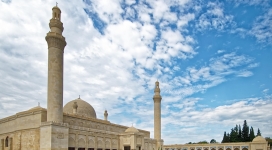As the death toll from the Tsunami in Asia mounts to over 150,000, it raises one of the most haunting questions of mankind: If God is a loving and merciful God, why would He allow such a disaster? Some assume the existence of such suffering disproves the reality of an all-powerful God. When actor Robert Deniro was once asked what he would say to God if he met Him, Deniro said, "I would tell him He's got a lot of explaining to do." That seems to be the feeling of many.
It must be admitted troubles are a part of the fabric of life -- and if God created the world as it currently exists, He would not be a good God, He would be evil. But the Scriptures teach God didn't create the world in the state in which it is today; suffering was the result of man's rebellion against God.
Since human departure from God in the Garden of Eden, affliction has been mankind's lot in every age. After Adam and Eve sinned, nature was deeply affected. No longer would the soil produce plentifully as it had, but man had to toil and work the ground -- he had to struggle to get the natural processes to cooperate with him. The human body started to fail with sickness, aging, and ultimately death. Women would bear children in pain. Sorrows of every kind beset the human race.
Jesus said, "In the world ye shall have tribulation" (Jn. 16:33).
Longfellow once wrote, "Into each life some rain must fall. Some days must be dark and dreary."
God is not evil. Pain and suffering are simply the natural consequence of man's foolish decision to go his own way rather than the way of his Creator. Apologist Josh McDowell explains: "Because of the Fall, the world now is abnormal. Things are not in the state they should be in. Man, as a result of the Fall, has been separated from God. Nature is not always kind to man and the animal world can also be his enemy. There is conflict between man and his fellowman. None of these conditions were true before the Fall. Any solution that might be given to the problems mankind faces must take into consideration that the world as it stands is not normal."
"But," someone may protest: "I thought nothing was supposed to be impossible with God. If adversity and calamity are the results of sin, why didn't God just create human beings so they would always resist temptation?"
The answer is there could never be genuine love between God and man unless love is freely given. Unless man is a free agent, he is nothing more than a robot. To say, "God should have created man with free will, but programmed him always do what is right" is as meaningless as to say: "God ought to have made a tripod with four legs." Part of being human, being made in the image of God, is that like God we can make our own choices.
C.S. Lewis further observed: "We can, perhaps, conceive of a world in which God corrected the results of the abuse of free will by his creatures at every moment: so that a wooden beam became soft as grass when it was used as a weapon, and the air refused to obey me if I attempted to set up in it the sound waves that carry lies or insults. But such a world would be one in which wrong actions were impossible, and in which, therefore, freedom of the will would be void ..."
Although disaster came into the world through man's sin, God wasn't content to leave mankind and the world in a fallen state. In the person of Jesus Christ, God Himself set out to forever do away with the afflictions of life. In her book, Creed or Chaos, Dorothy Sayers has written: "For whatever reason God chose to make man as he is -- limited and suffering and subject to sorrows and death -- He had the honesty and the courage to take His own medicine. Whatever game He is playing with His creation, He has kept His own rules and played fair. He can exact nothing from man that He has not exacted from Himself. He has Himself gone through the whole of human experience, from the trivial irritations of family life and the cramping restrictions of hard work and lack of money to the worst of horrors of pain and humiliation, defeat, despair, and death. When He was a man, He played the man. He was born in poverty and died in disgrace and thought it well worthwhile."
The Bible says Christ was tempted and tried in "every way, just as we are -- yet was without sin" (Heb. 4:15). He died on the cross to take the payment for our sin. "For the wages of sin is death" (Rom. 6:23). "But God demonstrates his own love for us in this: While we were still sinners, Christ died for us" (Rom. 5:8). In providing a remedy for sin, Christ cancelled the source of our sorrows and promises to return and set up a new world where there is no more pain -- a world essentially paradise regained (Rev. 21:5).
Of course, this doesn't mean believers in Christ should simply sit around ignoring the tribulations of their neighbor, while they wait for Christ's second coming. Because trouble wasn't God's original intent, Christians ought to endeavor to ease or eliminate it. Natural disasters and the like will never be stopped until God's plan of redemption is complete. Nevertheless, in the interim, followers of Christ must work, pray, and sacrifice to help those whose lives have been shattered.
Last week, columnist Dennis Rogers in the Raleigh News and Observer told the remarkable story of a rescue helicopter flying over isolated islands off the coast of India where the tsunami struck. According to Rogers, the islands are home to a few primitive tribes that have virtually no contact with the modern world. When the chopper's crew spotted a naked man standing on the beach, they assumed it was probably somebody who needed saving. As they hovered above the naked man and prepared to land, they watched him defiantly fix an arrow to his bow and shoot it at the aircraft.
The Scriptures do not tell us why God allowed suffering to come into the world, it only tells us how it got here. God's purposes are sometimes beyond our understanding. But what can be known is that God is willing to turn our tragedies into triumphs, if we'll let Him. As the hymnist William Cowper wrote: "Judge not the Lord by feeble sense, but trust Him for His grace. / Behind a frowning providence, He hides a smiling face." Moreover, God promises to eventually deliver us from all life's troubles and disasters, if we'll put down our bow and arrow of doubt and disbelief and stop assailing the One who came to rescue us.
Rev. Mark H. Creech
Christian Post Columnist







